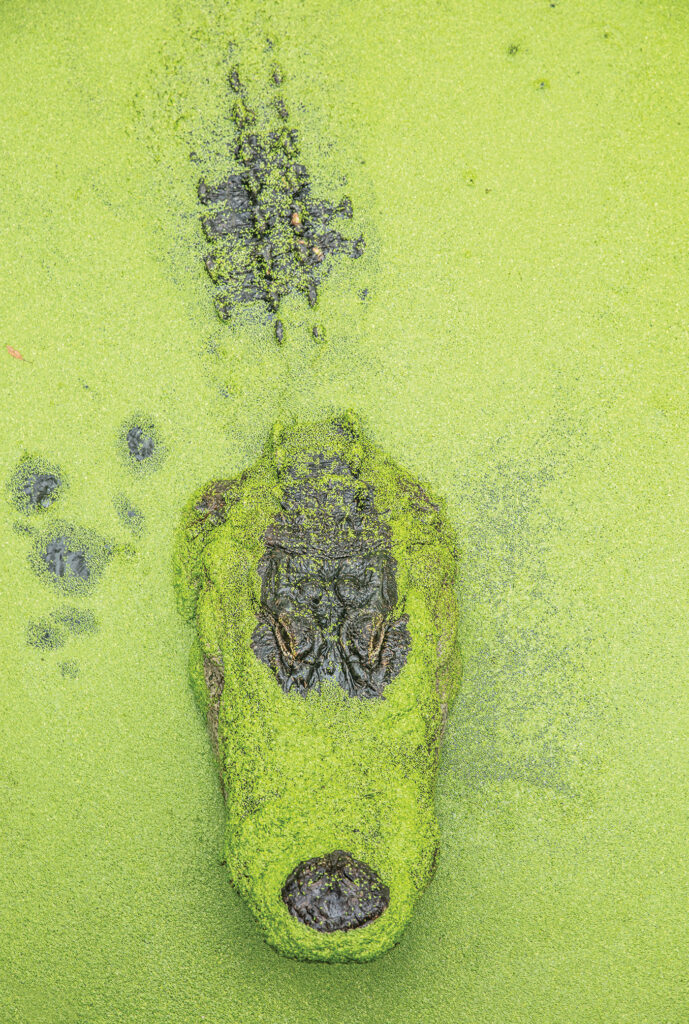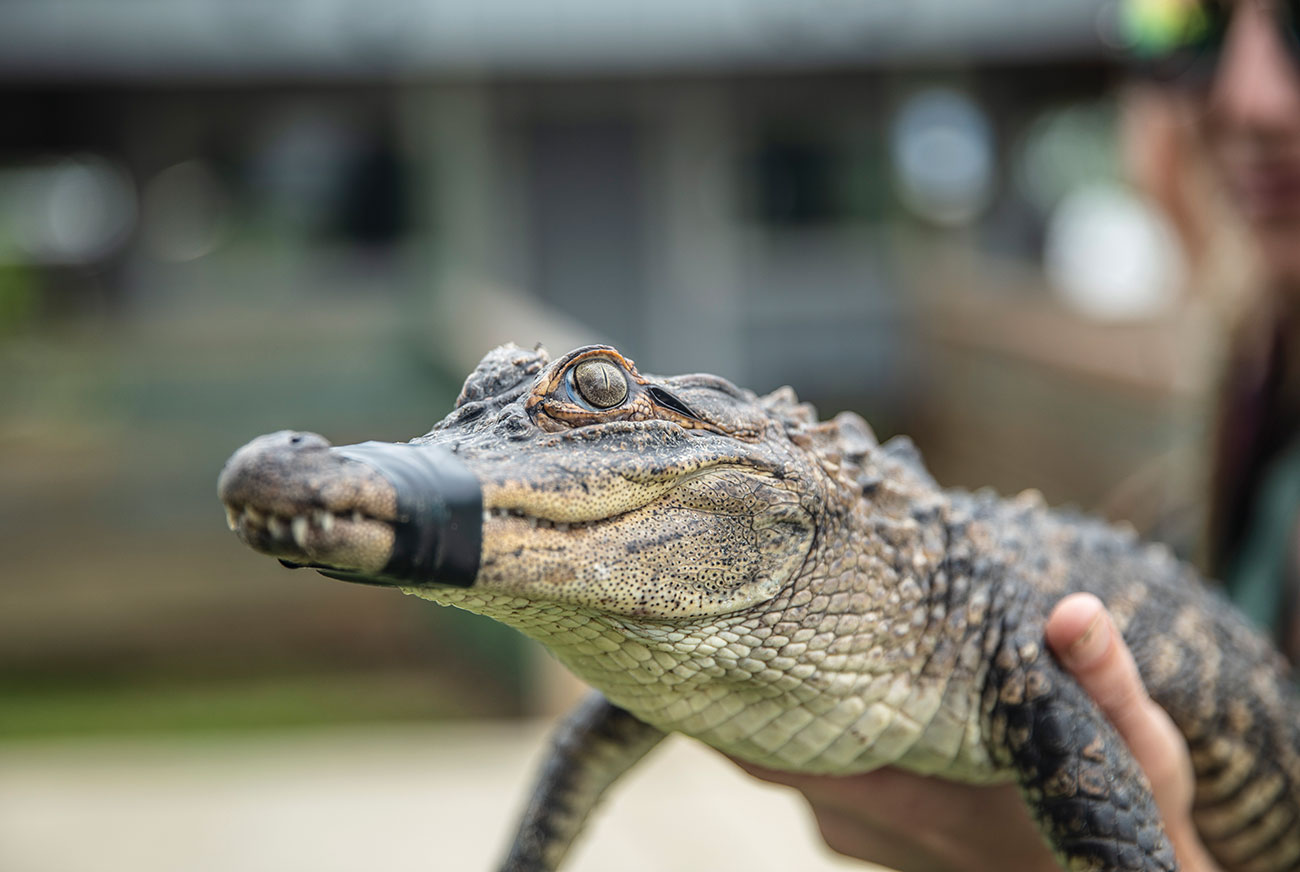
Wes Moore was a youngster in the early 1980s, back when his initial encounter with alligators was a fine three-legged specimen named Old Joe. While Wes and his grandfather fished, they tossed Old Joe scraps, which he delightfully snapped up with his clamping jaws. “Back then, we called those types of adventures spending quality time with your Paw-Paw,” recalls Wes of those happy days. “Today, they’d call it child endangerment.”
Nowadays, they would also call it Alligator Alley. The former vegetable garden and family plot of Wes’ ancestors is now a haven for reptiles akin to dinosaurs. Here, size does matter, and many are giants.
Old Joe, perhaps the catalyst of Summerdale’s reptilian wonderland, is no longer with us. But other alligators are — about 600 of them.
As Wes opens the massive entry gates to Baldwin County’s near-Jurassic Park experience, he smiles. “Lots of people say they are up to their necks in alligators, but I can back it up.” Indeed he can. They are everywhere, from almost-cuddly hatchlings to feisty mammoths. All are safely contained in vast acres of natural habitat, all for the awe of visitors.
Mobile Bay Magazine sat down with Wes in Alligator Alley, among its ponds, boardwalks and winding paths, where a charming directional sign proclaims, “Trespassers May Be Eaten.” We discussed his site, now a leading tourist destination with a national following. We talked about his life, his business, and of course, the care, feeding, and mystique of alligators.
The following is our interview with the Gator Guy himself. It’s a biting story.

Why the fascination with alligators?
Alligators are noble creatures. You always know where you stand with one. Unlike a dog, cat or horse, which may turn on you or even bite you, an alligator’s life goal is to devour you.
If gators had a mission statement, it would be, “I am an alligator. I am forever a predatory animal. I am designed to eat things, anything with a pulse, breathing or dead. I have done this for 5 million years and am very good at it. I do not care who you are. If given the opportunity, I will eat you.”
There is no more straightforward animal on earth. I like that. In addition, a fully grown alligator has no adversary except other grown alligators and man. Nothing else in nature will challenge one and live. They are not the slow, lumbering beasts as often portrayed in movies. In short bursts of speed, they can attack like a guided missile.
To me, they are fascinating. Alligators are opportunists. If you feed them every day, they will eat every day. Or they can go over a year without eating anything. They are survivors.

Why did you build Alligator Alley?
I wanted Alligator Alley to be more than just a place for people to gawk at big carnivorous reptiles. They are not monsters. All of God’s creatures have a purpose.
I wanted a place to show alligators’ roles in the environment. They are nature’s security guards, keeping other animals in line, such as feral pigs, which to us are pests, but to alligators, a delicacy.
Alligators are also nature’s garbage collectors. They eat entire carcasses — bones, fur, everything. When done eating, little or no trace of its prey is left.
People visit us and see these enormous reptiles in their natural environment. Too often they are unfairly villainized as big lizards that eat dogs and attack kids. Are alligators dangerous? Absolutely. But they were here first and may remain when we are gone.
Alligators didn’t encroach on our land, drain swamps, cut forests or develop residential and business real estate. Man did.
Alligator Alley offers these creatures sanctuary. We want to educate the public that, yes, these are dangerous animals and, yes, you should respect and fear them. But use common sense. We can coexist.
How did Alligator Alley start?
My family’s Baldwin County origins trace back to the 1860s, and my grandfather bought this land in 1939. It was a working vegetable farm. I grew up around here, but I have no formal training in working around animals.
After graduating from Auburn in 2000 with a degree in public speaking and double major in history, I pursued a career in radio / communications. Elizabeth and I married in 2001 and relocated with her job to York, England, where we lived for two years.
I blended in well with the English people (laughs). They called me “The Bad Yank.” We enjoyed England and seeing the world but returned to Baldwin County in December 2003. I always kicked around the idea of starting an alligator farm, open to the public.
I approached a venture capitalist and borrowed $154,000 of start-up money for the creation of Alligator Alley. He told me, “I’m going to be up-front with you. I will loan you the money because your plan will not work, you will fail, and then I will own your property.”
That debt was paid in 2007. I thanked the venture capitalist for his honesty, which became my motivation for working hard and making Alligator Alley a success. He never got our land.
Alligator Alley opened its doors on July 2, 2004, with 91 rescue alligators mostly from Florida. The majority of the stock we have today are the offspring of those original 91.

What is the key to Alligator Alley’s success?
People want to see big — really big — alligators. That is our drawing card. They don’t care as much about small ones. We have alligators here over 13 feet long and weighing 1,300 pounds. They live in natural habitats and are displayed as realistically as possible.
Other parks demonstrate feeding time with a staffer tossing a rat to a hungry gator. We toss entire hog carcasses to ours. People like to watch the big guys rip it to shreds.
Do alligators have personalities?
Oh, yes, definitely. Just like you and me. We have a few out here that are so complacent, I could almost let you sit on their backs. They wouldn’t care. (I decline; Moore laughs.)
One of my favorites is Simon, a blind female. She responds to my voice and comes to me on command just like a pet dog. But on the other hand, we have alligators with attitudes. I tell the staff to not go closer than 10 feet to those guys.
They also have a pecking order. During gator courtship, if you’re a big guy, life is good. If not, do what the big guys tell you, and stay under the radar. The pecking order for feeding time is similar. Usually large gators eat first, followed by the smaller ones.
Sometimes it seems like they are communicating with one another. The older fellows seem to say to the younger ones, “Hey man, life is good here. We don’t have to go anywhere! We got food! We got girls! Take it easy!”

Do you have any other favorites?
In addition to Simon, I like the really big guys, such as Captain Crunch, Big Easy and Colonel. The small ones are fun, but the heavy hitters, the ones that could grab and end your existence in a fraction of a second, those I like.
How do you know when an alligator is angry?
Alligators are very vocal, especially when they’re mad at you. There are three stages of gator displeasure. First, it will hiss, kind of like a cat does, except alligators hiss through their nostrils. It is reptile-speak for, “I really want you to leave me alone.”
Taking it up a notch, the next phase is a low guttural growl, which means, “Did you not understand the first time?”
The last step is jaw snapping. The gator slams its jaws shut fast and repeatedly, creating a loud snapping noise, usually meaning an attack is imminent. If you are still there after all three phases, you’re what I call a slow learner.
What type of safety gear do you use?
I carry a 4-foot stick and a hat. Alligators have pressure points, which we tap with a stick. Usually, they behave, especially if you tap around the slit behind their eyes or put pressure on their ear flaps. I can control a 13-foot-long alligator with just the stick.
My hat is for safety and training. Alligators learn by association. For example, if I suddenly stick my hat in your face … (He demonstrates on me, and I jump back.) See? You moved back. So do alligators.
But when the alligator recoils, it also opens its mouth. I immediately pop a fish in it. The gator learns to associate my hat with food.
Now, I could also just wave my hand in front of the gator as the food association tool. But if it grabs my hat and pulls away, I’m out $18 bucks to replace a hat. Hand replacement is much more expensive. Once a gator grabs your hand or arm and clamps down, you are on “Mr. Toad’s Wild Ride.”
Are you ever afraid?
As for fear, I have a keen respect for what these animals are capable of. A big gator could seize and eat you in minutes. I want to prevent that.
The thing to remember when working with these animals is to always work slowly and methodically. Don’t hurry. When you rush, you make mistakes. Mistakes with alligators can have permanent consequences.
Have you ever had a close call?
Egg harvesting time is always a close call or has the potential to be. When gathering the mother’s eggs, we are in water, the alligator’s element. Females have strong maternal instincts. If seen disturbing her nest, she will come for you like a bolt of lightning. You have to get in, grab the eggs and get out before she catches you in the act.
Incidentally, though female alligators become fired-up when anyone collects her eggs, the males are deadbeat dads. They must think, “I was there for the fun part. I don’t need any more of this.”

What do you do in winter when alligators are dormant?
I tell visitors, if you want to see bone crushing action and us running for our lives, come May through October. But if you really want to see alligators, visit during the winter season. Most of the vegetation is gone, making for outstanding alligator viewing and photographing.
During cold weather, they are sort of in suspended animation, sitting very still. Their metabolism shuts down. Guests can take their time viewing or composing the perfect photo.
Alligator Alley typically closes two weeks after Thanksgiving, reopens two weeks around Christmas and closes the last three weeks of January. We take the off-time to do maintenance work and repairs.
How did you fare during the pandemic?
The bigger question is how did we fare during COVID and Hurricane Sally at the same time. We shut down for COVID on March 23, 2020, and disinfected everything. We thought we would be down a week, but it was months. We lost the crucial spring break business.
But I still had nine full-time employees to pay, bills coming in, and of course, alligators to tend. We could not go on like that. I persuaded the powers that be that Alligator Alley qualified for an agriculture exemption because we are a farm. I pay a farm license fee to the state every year. It worked.
We reopened, and then Hurricane Sally hit us the following September, shutting us down again. COVID killed our spring; Sally obliterated our fall. There was a lot of damage to repair. We did, and we reopened.
This recent spring break was phenomenal. We are doing great.
Have you ever been bitten by an alligator?
(Smiles) As for being bitten, I have come very close; however, so far, no. I have not been bitten by an alligator. But ask me again tomorrow.
Alligator Alley – 19950 Co Rd 71, Summerdale. gatoralleyfarm.com





